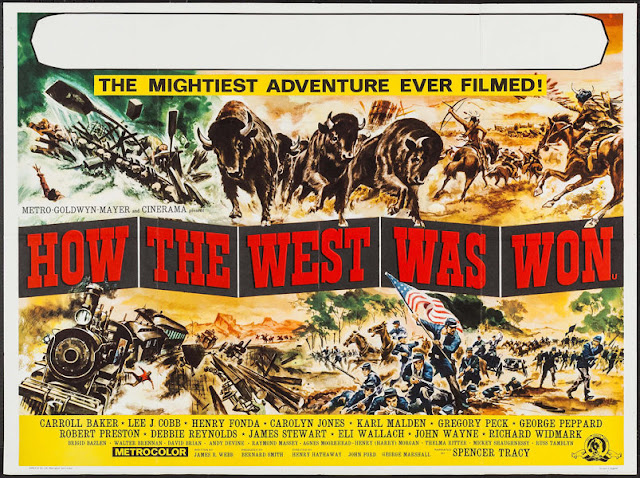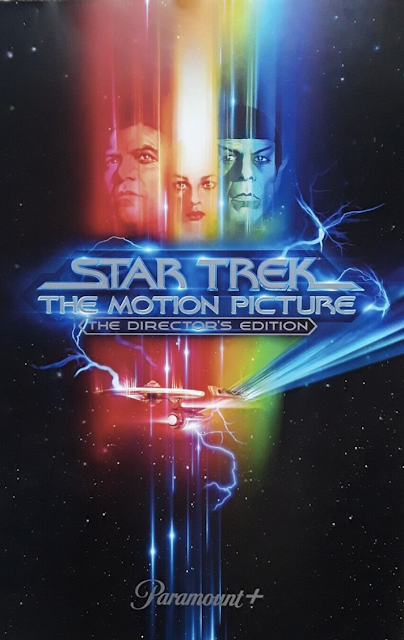Film 8/52: How The West Was Won (1962)
Having never experienced a Cinerama film presentation in person (in which three synchronized projectors display film shot across three cameras on a huge curved screen), I was very interested when the first Cinerama features were released on Blu Ray in a 'smilebox' widescreen format, designed to approximate the 146° curved Cinerama screen on a flat screen. I'm not sure how effective this is on a small screen, but on the Slaughtered Lamb's 120" screen, this 'smilebox' formatting definitely adds to the experience. (I included a 'smilebox' version of the trailer below so you can see the format firsthand.)
How the West Was Won was the first dramatic feature made using the three-camera Cinerama process (it had primarily been a format used for travelogues), and it's an epic story focusing on three generations of a family through several time periods in the 1800s; with three experienced directors brought in to shoot different sequences (John Ford directed the segment on the Civil War). The film has got an epic cast, with Debbie Reynolds as Lilith Prescott being the through-line across the three generations as she travels into the frontier with her family as a young girl, making her way to California to assume ownership of a gold mine left to her by an old flame, and as the matriarch of her nephew's family.
It would almost be easier to highlight which 1960s Hollywood stars do not appear in the film. Some of the most recognizable performers are Karl Malden, James Stewart, Walter Brennan, Lee Van Cleef, Gregory Peck, Thelma Ritter, George Peppard, Harry Morgan, John Wayne, Russ Tamblyn, Henry Fonda, Richard Widmark, Lee J. Cobb, Eli Wallach, Carolyn Jones, and a young (uncredited) Harry Dean Stanton. Spencer Tracy provides narration throughout the film.
As a fan of film scores, I am predisposed to enjoy an Overture, Intermission, Entr'acte and Exit music, and Alfred Newman's music for the film doesn't disappoint. I even enjoyed the handful of musical numbers that appear throughout the film. These weren't shoe-horned in, in a standard musical way, and take advantage of the singing and dancing skills of star Debbie Reynolds, appropriately reflecting her character's role as a performer at high and low points throughout her career.
While it's not joining the ranks of my all-time favorite Westerns (including Unforgiven, The Searchers, A Fistful of Dollars, The Magnificent Seven, Pale Rider, Tombstone, Open Range), I'm glad to have finally seen it. The nearly three-hour running time might turn off some viewers, but the story managed to hold my interest from start to finish. For some reason I had always assumed the film was a series of unrelated vignettes stitched together, so I was pleasantly surprised that the narrative — even with shifting points-of-view as different characters were brought to the forefront — made for a cohesive whole. And I particularly enjoyed the sequences that showed off the Cinerama format via smilebox, putting us right in the center of the action, whether traveling downriver on a raft, surrounded by a buffalo stampede, or caught in the middle of a train heist. Seeing the film in this format definitely made a difference, and I look forward to viewing more Cinerama films in this 'smilebox' format, including the forthcoming Wonderful World of the Brothers Grimm, which has just been restored on Blu Ray and might very well show up in this series down the road. (Sadly, the multi-disc Digibook version of How the West Was Won, the only version to include the Smilebox transfer, is out of print, but you might be able to find a cheaper used copy on eBay if you're inclined to check it out.)





Comments
Post a Comment